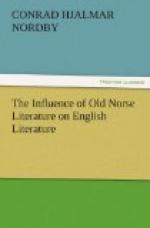Angantyr.—Daughter Hervor, full of spells to raise the dead, why dost thou call so? wilt thou run on to thy own mischief? thou art mad, and out of thy senses, who art desperatly resolved to waken dead men. I was not buried either by father or other freinds. Two which lived after me got Tirfing, one of whome is now possessor thereof.
Hervor.—Thou dost not tell the truth: so let Odin hide thee in the tombe, as thou hast Tirfing by thee. Art thou unwilling, Angantyr, to give an inheritance to thy only child?...
Angantyr.—Fals woman, thou dost not understand, that thou speakest foolishly of that, in which thou dost rejoice, for Tirfing shall, if thou wilt beleive me, maid, destroy all thy offspring.
Hervor.—I must go to my seamen, here I have no mind to stay longer. Little do I care, O Royall friend, what my sons hereafter quarrell about.
Angantyr.—Take and keep Hialmars bane, which thou shalt long have and enjoy, touch but the edges of it, there is poyson in both of them, it is a most cruell devourer of men.
Hervor.—I shall keep, and take in hand, the sharp sword which thou hast let me have: I do not fear, O slain father! what my sons hereafter may quarrell about.... Dwell all of you safe in the tombe, I must be gon, and hasten hence, for I seem to be, in the midst of a place where fire burns round about me.
One can well understand, who handles the ponderous Thesaurus, why the first English lovers of Old Norse were antiquarians. “The Awakening of Angantyr” is literally buried in this work, and only the student of Anglo-Saxon prosody would come upon it unassisted, since it is an illustration in a chapter of the Grammaticae Anglo-Saxonicae et Moeso-Gothicae. Students will remember in this connection that it was a work on poetics that saved for us the original Icelandic Edda. The Icelandic skald had to know his nation’s mythology.
THOMAS PERCY (1729-1811).
The title of Chapter XXIII in Hickes’ work indicates that even among learned doctors mistaken notions existed as to the relationship of the Teutonic languages. It took more than a hundred years to set the error right, but in the meanwhile the literature of Iceland was becoming better known to English readers. To the French scholar, Paul Henri Mallet (1730-1807), Europe owes the first popular presentation of Northern antiquities and literature. Appointed professor of belles-lettres in the Copenhagen academy he found himself with more time than students on his hands, because not many Danes at that time understood French. His leisure time was applied to the study of the antiquities of his adopted country, the King’s commission for a history of Denmark making that necessary. As a preface to this work he published, in 1755, an Introduction a l’Histoire de Dannemarc ou l’on traite de la Religion, des Lois, des Moeurs




